 About GamePeople
About GamePeople
Subscribe to the Family Gamer column:![]() RSS or
RSS or
![]() Newsletter.
Newsletter.
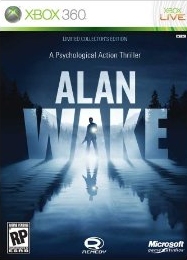
Format:
360
Genre:
Adventuring
Style:
Thirdperson
Singleplayer
Further reading:
The Shining
Uncharted 2 (PS3)
Halo
Twin Peaks
The Road
The Signal (DLC)
The Writer
Buy/Support:
Support Andy, click to buy via us...
Other GamePeople columnists have reviewed this from their perspective - huh?:
Story Gamer (360)
Soulful Gamer (360)
Perpetual Gamer (360)
Returning Gamer (360)
Scripted Gamer (360)
Scared Gamer (360)
Considered Gamer (360)
Tech Gamer (360)
Dressup Gamer (360)
Podcast (360)
Soundtrack Gamer (OST)
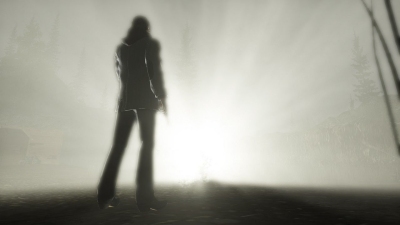
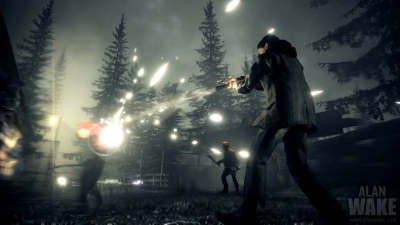
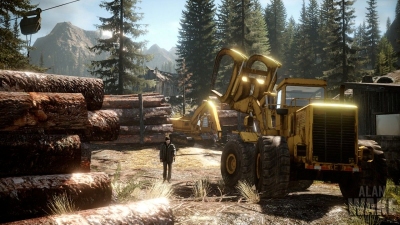
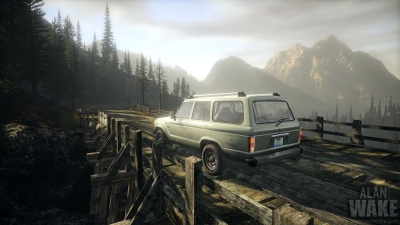
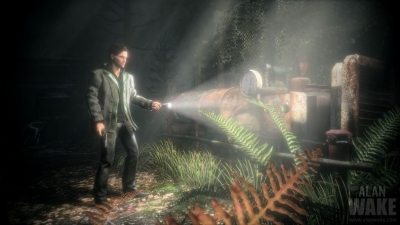
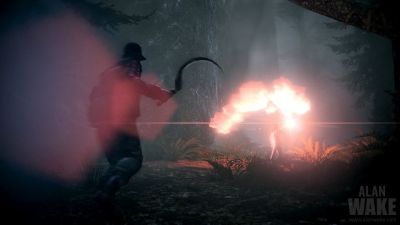
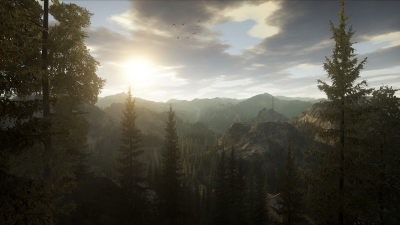
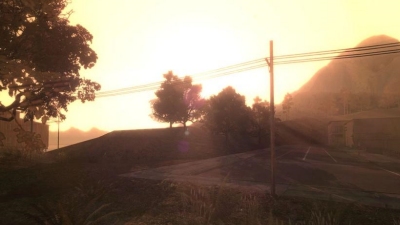

Alan Wake intentionally hobbles their open world and narrative to create the first genuinely interesting videogame story. Remedy's restraint with the environment and story mean they work together to support gameplay rather than compete with it.
I don't watch horror films, or psychological thrillers. I don't read Stephen King novels like The Shining. By rights I had no business playing Alan Wake.
But I did, and it awoke something in me (to use the vernacular). For the first time I found a real thrill of being hunted by a dark unremitting foe. The crash of strings just before a shadowy enemy attacked became a companion I learnt to appreciate and the claustrophobia of enclosed spaces became excitingly tangible.
The headlines do Alan Wake an injustice, and in fact served to keep me away from playing it. Although the long development time, supposedly grownup themes and clever script page storytelling hit the right notes for a game like this, it also made it sound rather derivative. Playing the game first hand however, it became more about the emotions of Wake and the rhythmic cycle of running, shooting and exploring.
As opposed to the everyday believability of Uncharted 2 (PS3), Wake offers escapism. An evening playing here is frightfully different from real life, and because of this is a thrilling release from the everyday grind.
Like the best games, Wake creates memorable gameplay moments of intense emotion. These interactions with a world stay with you after playing much more than the story or environments. The moment you emerge from the woods just as a chainsaw starts up beside you, or when you race to a distant light source that signals safety from a horde of blood gurgling locals, this is what stays with you and defines the experience.
But more unusual is that Alan Wake's story is as genuine and intriguing as the gameplay. While I enjoy the interplay of Uncharted's characters, Alan Wake is the very first game that has interested me in terms of its narrative. It's a simple, singular tale that I can relate to, not too overblown in terms of motivations and desires, while at the same time wonderfully grandiose in its scope.
Alan Wake is the first game that has interested me in terms of its narrative.
There is a knowing confidence about all this. The game threads its narrative deftly through the experience but is also able to let the player dictate much of the action. Sure, the pace and overall trajectory is preset, but the details and order in which things unfold are determined by the inquisitiveness of the player.
Through the game you can find pages of a book Wake is writing. Only, and here is the starting twist, he is somehow trapped in his own novel so the pages he discovers describe the events unfolding in the game.
This works on a number of levels. It leaves it up to you how much of this back story you want to read. It also cleverly foreshadows the events just down the road for the protagonist, so that when they unfold there is the added tension of deja vu.
This is much more than the plot gimmick I imagined from the game's headlines. Testament to this is that while I usually skip cut scenes (Uncharted accepted) here I got into a habit of searching for and reading through each and every page I could find.
There is a wonderful sense of achievement and closure at the end of each chapter.
My time with Alan Wake was helped a lot by the fact I liked the shooting mechanics as well. You use a combination of light and bullets to stop your enemies a little like Halo's combination of ballistic and energy weapons.
Save points are wonderfully generous throughout, although I think this may mean you can do more sprinting to the next light source than I did if the game is set too easy for you. Alongside these saves are the chapters that segment the experience.
The first chapter comes after an hour and a half which was perfect for me. Subsequent chapters seemed to stretch much longer though, closing on two and half hours. There is a wonderful sense of achievement and closure at the end of each chapter as the credits roll and a song plays. Then the start of the next opens with "Previously on Alan Wake" which perfectly adds to the late night mystery series feel of the game - Twin Peaks being the popular reference here.
The decision to go linear must have been a hard bullet to bite for Remedy.
Because this frames the experience so powerfully it was my intention to play the game in chapters. I eventually had to abandon this though as they were simply too long for an evening's play time - once the house had been tidied, kids in bed and TV had been watch with my wife. I still enjoyed the chapters but couldn't use them to punctuate my gameplay as I would have liked.
I'm about eight hours into Alan Wake now, and getting a better sense of what is going on - both in the story as well as how the game mechanics want me to play. As my confidence increased I ventured further afield in the environment and found the game already there to meet me. Excursions off the beaten track, whether on foot or in a vehicle, give away the fact that Alan Wake was originally going to be an open world game.
This means not only can you explore more than more linear experiences (again Wake has the edge on Uncharted here) without hitting invisible wall, but you can actually see where you are going and where you have been. The draw distance and exportability must have made the decision to go linear a very hard bullet to bite for Remedy, the developers.
The restraint over storytelling and their open world deliver an experience that lets the player's interactions take centre stage.
Like other aspects of Alan Wake though, I am glad they had the conviction and understanding to make these hard decisions though. The restraint over storytelling and their open-world deliver an experience that lets the player's interactions take centre stage rather than technology or narrative. And it is because of this that Alan Wake is a very interesting experience.
It means that both these things, the impressive environment and the well written story, serve the player rather than trying to impress them. This means they support the central gameplay experience that can then deliver much more emotion than either impressive visuals or a clever plot could on their own in a videogame.
My biggest worry now is that when I finish it that will be it. I'm not sure I will be able to revisit such an evocative and emotional time without somehow diluting it. It's the same reason I can't bring myself to re-read The Road (or watch the film) - my first encounter has become sacrosanct.
There are of course two downloadable chapters to try afterward, The Signal (DLC) and The Writer, but I suspect these are more afterthoughts than anything substantially new.
My hope is therefore pinned on Microsoft and Remedy's good sense to recognise the significance of what they have created here and dig in for another season. I'd be more than happy to wait as long again, if Alan Wake 2 is anywhere near as beguiling as my time with this largely unsung watershed in gaming.



Andy Robertson writes the Family Gamer column.
"Videogame reviews for the whole family, not just the kids. I dig out videogame experiences to intrigue and interest grownups and children. This is post-hardcore gaming where accessibility, emotion and storytelling are as important as realism, explosions and bravado."
Here are the games I've been playing recently:
© GamePeople 2006-13 | Contact | Huh?

|
Family Video Game Age Ratings | Home | About | Radio shows | Columnists | Competitions | Contact
With so many different perspectives it can be hard to know where to start - a little like walking into a crowded pub. Sorry about that. But so far we've not found a way to streamline our review output - there's basically too much of it. So, rather than dilute things for newcomers we have decided to live with the hubbub while helping new readers find the columnists they will enjoy. |
Our columnists each focus on a particular perspective and fall into one of the following types of gamers:
|